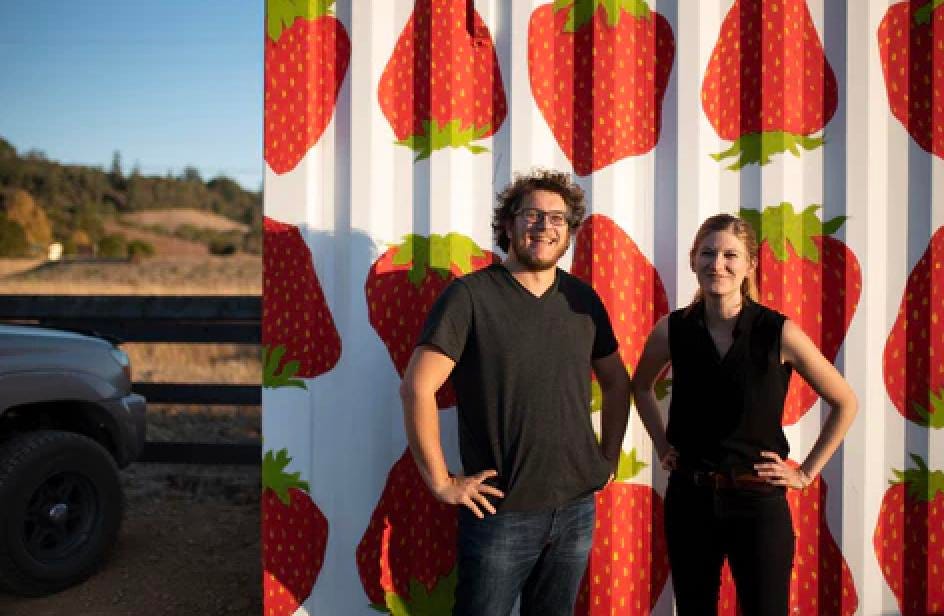Small-scale farming in America is still a challenge, says Krissy Scommegna of Boonville Barn Collective.
About 100 miles north of San Francisco, in Anderson Valley, in the small town of Boonville (population about 1,000), you’ll find the largest production of Piment d’Espelette peppers outside of France. It’s thanks to Scommegna and her husband Gideon Burdick who grow these unique peppers in abundance for chefs, and now for home cooks.
What started somewhat accidentally as a business has evolved into an example of small-scale production that’s highly specialized. When Scommegna worked as a sous-chef at The Boonville Hotel’s restaurant, she discovered the Espelette peppers: they were somewhat like a paprika, but with a bit more heat and complexity in flavor.
“These are not peppers you want to eat raw. But dried they produce a beautiful flavor and can be substituted for black pepper or chili pepper in dishes. They add layers of flavor with just a small amount.”
So naturally, Scommegna started growing them on her family’s farm while working in the kitchen. The first harvest was enough for the restaurant’s kitchen, and that of a few local chefs who became fans of the sweet but heated flavor. This enthusiasm led Scommegna to grow some more the next season, in an effort to feed the growing appetite from nearby restaurants. And over the years, it has snowballed into a business that goes beyond just chefs. From 2012 to 2109, Scommegna was building a business that was mostly for high-end restaurants. But the pandemic, required them to shift their business.
“We had to figure out quickly how to become a direct-to-consumer brand in 2020. It just became a reality,” she says.
Grocers and independent food shops started stocking the product in the Anderson Valley and in nearby counties, and they continued to sell through their website. Today their products are sold to about 500 restaurants and more than 100 specialty food stores.
Nacho Flores who works the farm, overseeing the production of peppers across 3 acres of farms, hails from Michoacan, Mexican. “He’s really adapted what he already knew about farming to growing the Espelettee peppers, and loves to experiment to see what works best,” Scommegna says.
The Espelette peppers are grown in France, and named after the town of Espelette where they originated. Featured heavily in Basque cooking, they’re a staple of the cuisine. Yet, here in Boonville, they’re referred to as Piment d’Ville. Just as Champagne is not called Champagne unless it comes from that specific region, the Espelette peppers also maintain that right, which makes them a pricey import found in limited quantities in speciality food shops in the US.
That’s why Scommegna sees an opportunity to bring something that’s exclusive and hard-to-find to more consumers here in America, re-fashioned as a California-grown pepper. Over about 6 acres, Scommegna and her team have divided the land judiciously to accommodate 80,000 pepper plants (of more than 12 varieties), but also are growing assortment of other crops: olives, dry beans, and even strawberries. Much of this is to help create a variety of products for Boonville Barn Collective, and draw out the harvesting season. Ofcourse, many of these crops also help regenerate soils, Scommegna says.
“By having a few more specialty products, and peppers that have different seasons, we’re able to have an interesting assortment of products to offer customers, instead of just one variety. Plus, we can keep harvesting plants throughout the year then.”
Everything though still takes place on the farm: the peppers are grown using last season’s seeds. Then harvested and dried on site. Shortly thereafter they’re crushed and packaged into glass jars, and shipped to customers — all from the farm.
This kind of hyper-local operation is possible because they’re still farming on a small scale by industry standards. But Scommegna is OK with that. She’s less interested in creating a chili or spice empire, and more so, serving the needs of chefs and foodies who want to explore heirloom varieties and less readily-available products.
“We also take great pride in paying all our workers. No one works on our farm for free, or for exchange of room and board. This might make our products pricier. But we feel that’s the true cost of farm-grown product in northern California,” she says.
While all the farming is done organically, Scommegna explains that they’ve not pursued certification. Instead, they’ve adopted the Renegade certificate, which is only available in Mendocino County in California. The Renegade program, she says, started out because farmers wanted to go above and beyond USDA organic.
“It’s actually stricter than the national program. And it’s designed specifically for growers here in the county. We have a different climate, soil, and growing environment than farmers in the Midwest and East coast, and so we wanted something that was specific to the needs of the local community. Mendocino county was also the first county to ban GMOs in the US.”
It’s this fervor for organically-grown, localized production that Scommegna wants to keep going. It’s been over a decade since she harvested the first peppers in Boonville. “Building this kind of business is not easy. You have to think about the sustainability of the soil, the people, the business, and balance it all.” But the challenge continues to feed her.
Read the full article here




